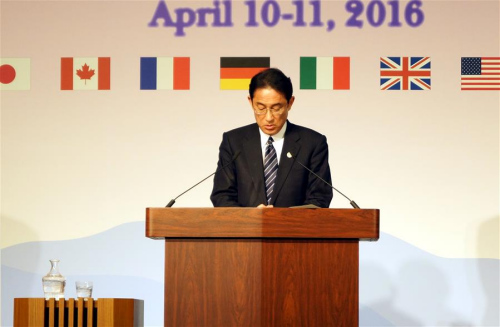
Japan's Foreign Minister Fumio Kishida speaks during the press conference after the G7 Foreign Ministers' Meeting in Hiroshima, Japan, on April 11, 2016. (Photo: Xinhua/Yan Lei)
Once again Japan hijacked the multilateral Group of Seven (G7) platform to serve its own purposes and to meddle in South China Sea affairs in an unwanted attempt to "contain" China, which is not only unjustified and unhelpful for resolving disputes, but also harmful to regional stability.
The two-day G7 Foreign Ministers' Meeting closed here on Monday with four joint statements issued by the member countries, one of which is about maritime security. The statement expressed "concerns over the situation in the East and South China Seas" and opposed "any intimidating, coercive or provocative unilateral actions that could alter the status quo and increase tensions".
The document is a result of the "consistent efforts" of the Japanese government, which, as host country, seized the meeting for its own agenda and unilaterally hyped up the South China Sea issue, despite the fact that none of the G7 members are relevant parties to the issue.
It is not the first time for Japan to attempt to take advantage of this multilateral framework to contain China. Last year, Japan pushed its unilateral agenda through a similar document on maritime security in the G7 Foreign Ministers' Meeting in Lubeck.
In the statement, Japan referred to protection of navigational freedom as an excuse for its meddling, and deliberately ignored the fact that China has repeatedly confirmed its commitment to maintaining freedom of navigation and overflight in the East and South China Seas.
Japan also paid no heed to China's efforts and tireless contribution to regional stability, despite the fact that the Chinese Foreign Ministry has reiterated China's commitment to solving maritime disputes through negotiations and consultation, directly with concerned parties on the basis of respect for historical facts and international law, so as to jointly safeguard the peace and stability in relevant waters, and for the betterment of security in the broader region.
What the Japanese government did is definitely not in the interests of the region, but only to stir up perceived regional tensions. Behind it is Japan's thinly veiled masterplan to drive wedges between China and other regional players and to draw western countries into an erroneous debate to contain China.
Japan also attempted to divert China's attention and resources from the East China Sea by interfering with disputes in the South China Sea.
Yet despite Japan's hyping of what it has dubbed a "China threat" and general smearing of China's peaceful advancements, in many people's eyes, including locals here, Japan itself is a potential threat to and sower of discord in the region, with its rise of ultra right-wing forces and attempts to revise the pacifistic Constitution and rewrite and undo decades of globally revered pacifism.
Morita, a university student, said in a protest here last Sunday that the Japanese government tried to forge a peace-loving image when hosting the G7 Foreign Ministers' Meeting in Hiroshima. But he believed what the government was ostensibly doing, such as forcing the security bills through parliament despite the atomic bombing survivors' protests and against majority of public opinion, was not peace-loving and was, visibly, against the people's will.
"The security bills that came to effect on March 29 made Japan a country that could start wars. Besides this, Japan recently strengthened its military alliance with the United States and South Korea. These are actions that could drag Japan into wars." said Yasuhiro Ikkanda, another protester and advocate of Japan adhering to its constitutionally-mandated pacifist values.
It was and now is high time for Japan to listen to the voices of its people and to reflect on its policies regarding regional security and its relationship with China, a former friend and monumental economic associate.
Japan, for the future of its own people, their security and the nation's now-fragile economic security, should consider China as a partner that it should cooperate with to promote regional stability instead of a threat or foe. The choice is not in the hands of China, it's in the hands of Japanese government to make better, fundamental decisions, to ensue the safety and prosperity of future generations. To deviate from this commonsensical view could, in all actuality, be disastrous for the island nation, as history has already proved.


















































